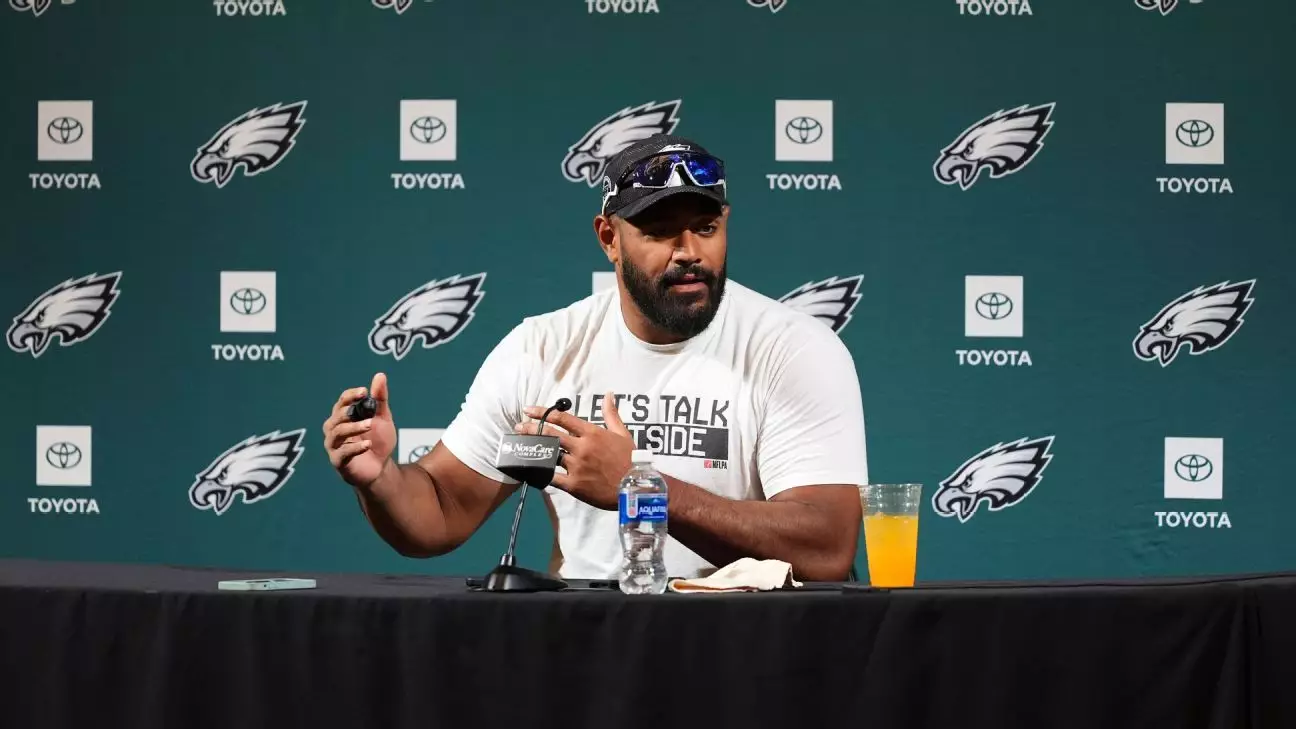In the world of American football, where every inch counts, certain plays can become pivotal in defining a team’s offensive strategy. One such play emerging from the Philadelphia Eagles is the “tush push,” a quarterback sneak tactic that has sparked significant debate about its place in the league. As the NFL gears up for a critical vote that could potentially ban this maneuver, important voices within the Eagles locker room are downplaying its impact. Players like A.J. Brown and Jordan Mailata have shown a refreshing nonchalance about the issue, framing it as a tactic rather than an essential component of their game.
From Brown’s perspective, the play is merely about gaining a single yard – a seemingly minuscule gain in a sport often won or lost on the margins. His comment encapsulates a broader sentiment among players who understand the ebbs and flows of game strategy rather than fixating on any one element that could be perceived as a “secret weapon.” Mailata’s dismissive view of the ban, underscored by his quip about the name “tush push,” reveals an inherent resilience and readiness to adapt regardless of what the league decides.
Short Yardage: A Chess Match
The anticipated vote by NFL owners to potentially ban pushing a quarterback on sneaks is reflective of a broader anxiety within the league. Coaches and owners alike worry about the fairness and competitiveness around such tactics and whether certain plays could provide an “unfair advantage” to teams that master them. The Philadelphia Eagles, under the able guidance of coach Nick Sirianni, have cleverly fashioned the “tush push” into an art form. Despite concerns, Sirianni himself has fiercely defended the play, characterizing it as a normal evolution in football strategy rather than an anomaly.
It’s vital to consider the value of innovation in sports. If a play is becoming exceedingly effective, kicking it to the curb just because it’s advantageous to a few teams seems counterproductive. Following the concept of fair play is essential, but so is embracing the creativity inherent in the game. NFL CEO Jeffrey Lurie has articulated this perspective well by stating that banning effective strategies would be detrimental to the spirit of competitive play, which thrives on the tactics introduced by diverse teams across various seasons.
The Numbers Tell a Deeper Story
Analyzing the statistics around the “tush push” sheds more light on this conversation. According to data provided by ESPN Research, the tactical maneuver comprised a mere 0.28% of total plays in the previous season, indicating that while instrumental to a few, it is far from the common playbook standard. The Eagles and Bills accounted for the majority of successful “tush push” attempts, achieving impressive results that place them far above the league average. Notably, the success rate on these pushes hit an astonishing 87%, compared to only a 71% success rate for the rest of the league.
This data suggests much about how the Eagles have prioritized their strength, leveraging a robust offensive line and a quarterback like Jalen Hurts, who possesses incredible physical capability. When expert athletes work in tandem—from the offensive line to the quarterback—a successful strategy unfolds, showcasing a unique synchronization that other teams may struggle to replicate.
Adaptation is Key
Regardless of the looming decision on the “tush push,” the Eagles exemplify what every team should strive for: adaptability. As both the players and coaches signal their readiness to pivot should the ban be enacted, it unveils an essential quality of successful teams—the ability to redefine tactics under shifting circumstances.
An effective coach not only acknowledges the prevailing strategic landscape but also builds a team that thrives on challenges. The Eagles’ leadership recognizes the need to continue to innovate and regroup strategically. If the endangered play does face its demise, fans can expect the coaching staff to seek alternative tactics that reflect the ever-evolving dynamics of football.
The decision regarding the “tush push” may still be uncertain, but the insights from player perspectives and statistical breakdowns highlight an important narrative: football is much more than just a series of plays; it is a continuous, dynamic chess match demanding creativity, teamwork, and, above all, an unwavering resolve to master the game.


Leave a Reply